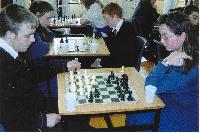The winners of the annual Irish Scholarships to the Gealscoil in Ballybunion were Donal O’ Callaghan and Elizabeth Morley
Category: News
Transition Year trip to Gaeltacht

The Transition Years will visit the Blasket Centre in Dun Chaoin as part of their overnight visit to the Gaeltacht on 10th and 11th May

Adare Manor Visit
6th Year Chemsitry to travel to UCC

The 6th year chemsitry class will travel to University College Cork for a day of experimental work in the Laboratories in preperation for their upcoming exams
Toastmasters
National Spring Clean
Hazelwood College Young Scientists
Summary of findings from recent Whole School Evaluation Report
The school’s mission statement is lived out in the daily running of the school.
There is a positive atmosphere in the school. Caring for students and providing a safe and secure learning environment are fundamental aims of the school. The school shows very good success in achieving these aims.
A very significant feature of the school is the very high level of voluntary participation by staff in extra-curricular and co-curricular activities. Without the generous goodwill of teachers the fabric of school life and the extent of its co-curricular and extra-curricular provision would be markedly different.
The board is supportive of the work done by the school staff.
The effective management of students is a very strong feature of the school.
The school facilities are clean, comfortable, in generally good repair and well equipped.
There is a well-developed school development planning process in operation. There is a high level of participation by staff in the school development planning process and very good work has been done in a collaborative and collegial manner.
The school has a history of involvement in curriculum innovation and is seen as responsive to the needs of its students and the local community.
Care for students is a core strength of the school. In particular, care for students in the transition from primary to post-primary school is an important aspect of the school’s work.
The school maintains good communication with parents and has developed good links with the local community.
Classroom management was very good in all lessons observed. Discipline was maintained in all lessons in a positive and secure learning environment.
Students were attentive, motivated, and engaged in their learning.
There is strong awareness of and commitment to students with learning support, language support, and/or special educational needs in Hazelwood College.
The work of the Student Support Team (SST) is of great benefit to students and the school.
The school has an active and effective students’ council





